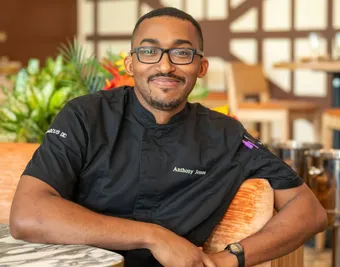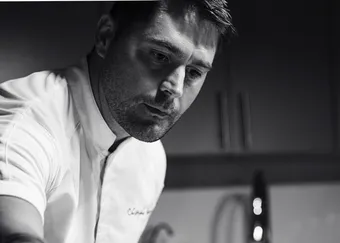The biggest problems every Restaurant Operator must overcome
Salar Sheik is a restaurant professional with over 20 years of industry experience. He is currently helping his clients build successful establishments and in this interview, he shared some of the biggest problems every operator is currently facing and how to overcome them.
It is to no surprise that labor shortage remains one of the biggest issues in the restaurant industry. We asked Salar how to overcome labor shortage and how to keep staff memebers around. More often than we want to admit high turnover rates are connected to poor management, so the first thing you need to consider when opening your venue is whom you are hiring to lead the teams.
Even though labor shortage is a huge problem, a lot of job seekers can’t seem to find an industry job. We tackled some of the biggest red flags when it comes to CVs, interviews and more. Follow along if you want to find out what needs to be done to land the next big role.
What is the most important trait of a successful restaurant/business owner?
Salar, you started out as a Dishwasher at a young age and move to bussing tables. What were the qualities that took you from those positions to running a successful business? In other words what are the traits of a successful business owner?
Salar: Hospitality is full of challenges—speed bumps and detours that make the journey anything but straightforward.
The most important trait of a successful restaurant or business owner is resilience.
For me, it all started with a passion for food and beverage, which I still have, and a natural interest in creating guest experiences and building teams. Hospitality offers so many different aspects to focus on, which keeps things fresh. If you’re someone who needs variety and thrives in a fast-paced environment, like I do, this industry is a good idea.
Is offering different career paths the right approach to attract younger generations?
Salar: Yes, offering different career paths is a great approach to attract younger generations.
Hospitality naturally draws in diverse personalities, and understanding where people fit best—whether as a host or in the kitchen—is key. For instance, more introverted, creative individuals might thrive in the kitchen.
Recognizing that potential during the interview, beyond just the resume, by observing attitude, body language, and energy can take your recruiting to the next level.
It's about seeing someone who might make a great server, even without experience, and investing in training to help them succeed. This approach opens up various roles for different personalities, creating pathways that can attract younger talent looking for flexibility and growth.
Which skills should you look for when hiring front vs. back of house?
Salar: When hiring for front of house versus back of house, the key skills differ.
For front of house, personality and communication are essential.
You want people who can connect with guests, respond well to unexpected questions, and maintain a positive attitude.
In the back of house roles, it’s all about quick learning and handling pressure.
Every kitchen—whether it’s a sandwich shop or a full-service restaurant—faces intense stress at times, so hiring level-headed, hard-working individuals really pays off in these roles.
How to write a CV that will guarantee getting hired?
Salar: To write a CV that stands out, focus on clarity and relevance to the role.
A long resume doesn’t mean a better one—get straight to the point and avoid adding unnecessary details.
For back-of-house roles, emphasize specific skills: list your experience with equipment like combi ovens, proficiency on the grill, or abilities in plating and expo.
This shows exactly what you bring to the table before the interview.
For front-of-house roles, stability is important. Show consistent work history, and if there are gaps or short stays, add a brief note explaining why, such as “moved for new opportunities” or “left due to restaurant closure.”
This context helps hiring managers understand your journey and gives them confidence in calling you for an interview.
What is your favorite interview question?
Salar: My favorite interview question is: “Tell me about a time when everything went wrong and how you fixed it.”
No restaurant is perfect—not even the top-rated ones. There’s always a night when the POS goes down, two people call out, or a customer has an issue with their food. I want to hear how a candidate handles those high-pressure situations.
This question reveals a lot. Sometimes, you get long, detailed answers that show their thought process. Other times, you get a short, direct answer that shows they’ve been through it and know how to get over those hurdles.
What are the biggest challenges when transitioning from an employee to a business owner?
Salar: The biggest challenge in moving from an employee to a business owner is navigating all the new “speed bumps” along the way. My business transition went well, but it was gradual. I started by consulting part-time and gradually built up my client base. During this period, I had to learn the fundamentals of running a business, like setting it up, maintaining it, dealing with insurance, and handling advertising. A lot of these tasks aren’t second nature to people in hospitality.
You have to step outside your comfort zone and learn skills like accounting and taxes—things that are essential but don’t come with the job of being a chef or manager. Being a business owner means becoming knowledgeable in multiple areas, even ones that may feel intimidating.
For example, if you’re not strong in accounting and are uncomfortable with it, you’ll need to push past that fear and get comfortable with new skills, even if they’re outside your initial expertise.
What are the five biggest challenges restaurant operators are facing?
Salar: Two out of the top five challenges for restaurant operators today are connected to hiring and staffing. But this shouldn’t come as a surprise. It’s the biggest pain point in this industry. Rather than focusing on the problem we need to focus on the prevention and solution.
There are several challenges, but if I had to pick five, it would be these five:
- Labor Costs: Labor costs in the U.S. are rising, and balancing these expenses is a constant juggling act.
- Cost of Goods and Inventory Management: Managing the cost of goods, tracking inventory, and adjusting the menu to reflect these costs are ongoing tasks that require close attention to keep budgets in line.
- Effective Advertising and Branding: Staying relevant in a competitive market, whether you’re a pizza place or a sushi restaurant, demands consistent branding and marketing. Many restaurants struggle to stand out and attract their ideal customers.
- Employee Retention: Retaining employees is a major challenge, especially when workers often seek new opportunities. Building a supportive work culture is essential compensation alone isn’t enough anymore. It’s about creating a positive, non-hostile environment where team members feel valued, and managers are level-headed.
- Leadership and Morale: Leadership quality directly impacts staff morale. When owners and managers are burnt out or visibly unhappy, this negativity trickles down to employees, who may start looking elsewhere for a better atmosphere. Remembering that management sets the tone can help reduce turnover and build a motivated team.
These are layered issues without one-size-fits-all solutions but tackling them thoughtfully can make a big difference in the restaurant’s success.
What are the most important things new business owners should consider?
Salar: New business owners should focus on a few key things:
- Define Your Brand Clearly: Know what your restaurant or business style is—whether it’s quick-service, casual, or fine dining—and make sure you’ve defined your brand and what it offers.
- Identify What You Do Best: Focus on the one or two things you do better than anyone else. For example, if you're an Italian restaurant, think about what makes you different from the other Italian place down the block. It’s not about doing everything better; it's about highlighting and excelling at those specific strengths.
- Market Your Strengths: Once you know what you’re best at, make sure your branding and marketing reflect that. Immerse yourself in these strengths, as they’ll be what set you apart and make you memorable to customers.
Focusing on these essentials helps new businesses stand out in a crowded market and connect with their audience.
What is the one thing you wish you knew before joining the industry?
Salar: One thing I wish I knew before joining the industry is that learning never stops.
There’s no clear, written path, and no matter your background—whether you studied hospitality or, like me, biology—you’re constantly facing new unknowns. Our industry evolves quickly, so what helped me 10 years ago is important, but so is what I learned in the last five years.
You can’t ever think you “know enough” about hospitality, wine, cocktails, or cuisine, because they’re always changing.
If you stop learning, you risk becoming stale or even going out of business.
Identify What You Do Best, Set Up Good Leadership — and Success Will Follow
In this interview with Salar Sheik, we covered all the biggest issues that restaurant operators face and how to overcome them. We talked about the disconnect that is happening on the job market and how to minimize the gap.
Identifying what you do best, marketing it, setting up good leadership and appreciating staff members are the golden ticket to a successful establishment.
And for those searching for a job, having a direct CV that showcases your skills is your interview entry ticket. Practice situational questions as those are favorite to hiring managers such as Carolina Franco.
Whether you are looking for a job or looking for staff members we’ve got you covered. If you need a little bit more confidence, check out other inspiring OysterLink stories.






Loading comments...